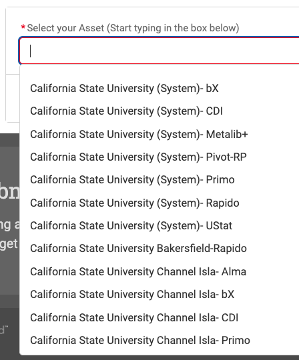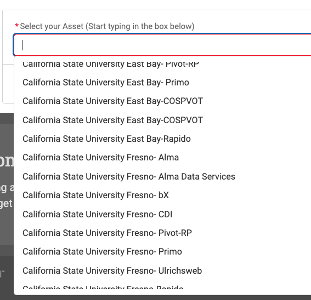Support for Consortia
We started a new practice in the Spring 2024. We initially had a Google form for ERM issues that would “create” cases in Trello. We used that from 2017 to 2024. Trello changed their policy on how many “free” users you could have, and I was over the limit but quite a few people.
So, we did a complete revamp of how to report issues and where to report issues.
Previous Process:
Libraries reported electronic resource issues for collections managed in the Network Zone.
That could be anywhere from an issue at the provider’s side, such as EBSCO, ProQuest, Gale, JSTOR, etc., to issues with collections in the NZ or with CDI records in PrimoVE. That was becoming unattainable for me to report all those cases, track them, test fixes, update libraries and ExL support, contact everyone involved with the case.
We created a new whole new process along with an email for e-resources that would go to myself, the collection development librarian at the Chancellor’s Office, and the project manager for our unified system. The email is answered depending on the issue, if it is collection development related, or e-resource related.
Libraries now contact providers if they have lost access to the site or a journal.
Libraires open SF cases if a record in PrimoVE is incorrect or CDI records are incorrect.
Doesn’t matter if CDI records are managed in the IZ or the NZ, libraries open the case.
The Chancellor’s Office can see all the cases so we can examine cases for a pattern if we are seeing the same issue reported multiple times.
We also encouraged libraries to post issues to Slack to see if other libraries are having the same issues. That seems to work great, improved communication between the libraries.
Libraries report issues with portfolios or collections to me since I’m the only one who can make changes to E-collections and portfolios.
The Chancellor’s Office librarians meet with Ex Libris support team once a month to go over cases that are taking too long to get a reply or update.
Also, if a library didn’t like the answer or understand what ExL’s reply, they report that to our Project Manager. I look at my open cases or my cases with development, see if any should have an update or what the status is. Our Resource Sharing librarian does the same.
Example: I reported that JSTOR 2023 end dates were removed from the Alma collections. I reported the issue to ExL and the reply back was that they couldn’t add those end dates. Reply didn’t make sense so we took the case to our meeting with support. After that meeting, they suggested talking to Tamar with the Content team. Met with Tamar and I explained why this is an issue and she agreed that current solution is not a good one. Tamar said they would work with JSTOR to get better title lists. All of libraries are included in the central office agreement so this affected all the libraries. I included this information in my weekly ERM & CDI update to notify the libraries of the situation, where we are on the issue and that I’m also working on adding the missing dates to the JSTOR portfolios. If every library had reported this issue, it would have been a little chaotic and they may have accepted that the end dates would not be added. We do like to use the Central Office to do this higher level of support and pushback if we don’t like the solution. I’ve asked libraries to report any of the portfolios they do find missing end date, to either me or to ExL support so we can prove it is an issue, with JSTOR support.
We try to do this more often, let librarians and library staff do their day-to-day work and the CO works with ExL support or provider support teams to resolve issues that affect all of the libraries.
New Process:
Created a few new wiki pages for support:
Shared eResources Problem Reporting Best Practices
EBSCO Guidelines for opening cases
Best Practices for opening SalesForce cases
Ex Libris changed our SalesForce to include all the libraries and all the products they use from Ex Libris, such as bX, CDI, Rapido, Alma, Primo, etc.
When the CO creates a case for a library, they include the reporting library’s email in the case so they can reply to support to report if the issue was fixed or if it didn’t work. We also ask libraries to add the email from the Central Office librarians if they open a case that we need to know about and keep track of the solution. This has sped up the response time for libraries.
Figure 1 Dropdown from the CO's view of SalesForce
Figure 2 Dropdown menu for CO SalesForce
Consortia case - asked support about the CZUTL errors “ng params: null”
All of our libraries saw this issue, they were opening up separate cases until I opened a CO case and reported the issue to the libraries in the ERM & CDI weekly update sent out to all the libraries.
Case first opened 9.4.24
Response dates from Ex Libris Support: 9.10.24, 9.16.24, 10.14.24, 10.23.24
The reports from the first week of October still had the error but after that, the reports have been “normal.” There was an error in the update that was stating linking parameters were being updated but they weren’t (which is how it should have worked). No explanation on why it was happening but by reporting via the CO account, we saw quicker replies than the libraries who had opened individual cases.
Wendy’s description of the FLVC consortia support cases:
We require all member institutions to report the majority of support issues to the FLVC HelpDesk so that we can troubleshoot the issue first. If FLVC is unable to resolve it, we create a SalesForce case.
Our HelpDesk is managed by a Training and Support team, and HelpDesk cases are put into queues based on the functional area of the issue (Discovery, Fulfillment/Resource Sharing, Acquisitions, E-Resources, Cataloging, Analytics, Digital Services, General). We are notified via email of newly added, or updated cases.
The one exception is, we allow interested member libraries to report E-Resource related metadata issues or linking issues directly to ExLibris by using the Report a Problem feature in Alma. The FLVC office sets up this access to submit cases, which is requested by the member library - usually by the E-Resources library at the institution/library.
We support the libraries at 40 institutions, including the ones at 28 college institutions, many with limited staff and resources, so the majority of them report issues directly to the FLVC Helpdesk for us to troubleshoot first before sending to SalesForce.
The FLVC office staff have a Consortia login that allows us to see all cases submitted by member libraries or FLVC staff. We have an internally created email distribution list that is tied to the login, so all applicable FLVC staff are copied on the SalesForce email case exchange.
Once every two months we have a call with our ExLibris Support Team to discuss any outstanding SalesForce cases or questions. We typically provide an agenda in advance, with SalesForce case numbers that are months old and/or have little to no feedback, or ask any questions, often about poorly managed cases. (We used to meet monthly following implementation, but changed to bimonthly a year or so afterwards)
One recent example dealt with 2 or 3 cases related to Resource Sharing. We submitted the cases about requests being sent to an unexpected partner among our member libraries, or a missing pullslip, and were told by support that because of the nature of Resource Sharing requests, they change statuses fairly quickly rapidly, they needed to see more recent examples so that they could troubleshoot the problem. We gave up to date examples and on one case put a note in bold to Review Immediately, but weeks went by before any response was given.
Recently, in August 2024, an Customer Success Manager introduced herself to use during the Support Call, and met with us in early October to discuss Signature Success: Goals and Deliverables and Success Planning.
We are still unsure about what to expect from Signature Success. FLVC is fully funded by the state and are limited by the budget as to what we can purchase for consortia members. We also have a Member's Council with a handful of subcommittees that offer guidance on the needs, future projects and direction of the consortia.
The only feedback we were able to provide were related to current projects that we are working on and support related issues.
From MD at USMAI:
“At USMAI, we have a very similar model to FLVC. We request that the IZ log their issue locally so that we can help them troubleshoot. Having just migrated in May 2024, it is helping us find out issues so that we can follow up during our weekly calls with our members.”

